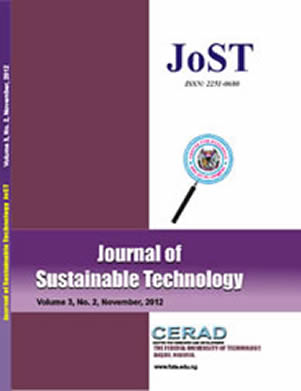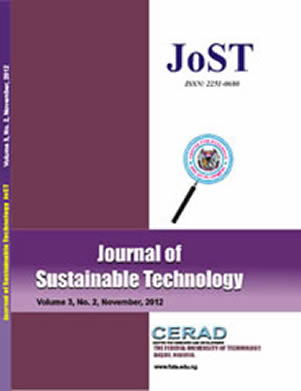Pendimethalin, despite being widely used for weed control in crop production has
been classified as a persistent bioaccumulative toxic (PBT). It is therefore thought that this herbicide
is likely to impact the elements of soil fertility. To investigate the influence of pendimenthalin on
the growth of okra as well as the residual effects of its application on soil physico-chemical properties,
a completely randomized pot experiment involving three replications was performed in the screen
house of the Department of Crop, Soil and Pest Management, Federal University of Technology
Akure (7????16????N, 5????12????E), Southwestern Nigeria. The treatments imposed were six application
rates of pendimenthalin, a weed free, and a weedy control. Results indicated that pendimenthalin at
all the rates tested did not affect okra seed germination; however the supra optimal rates of
pendimenthalin (0.99kg a.i. ha-1 and above) exhibited phytotoxicity to okra seedlings and engendered
100% seedling mortality at 3 weeks after planting (WAP), and pendimenthalin treatment at 0.33kg
a.i. ha-1 competed favorably with the weed free treatment with respect to okra growth. Weed control
assessment parameters (weight and density of weed removed at okra harvest) decreased with
increasing dose of pendimethalin. Results further showed that pendimethalin increased soil nutrient
contents compared to the untreated pots. It is hence concluded that pendimethalin dose of 0.33kg
a.i. ha-1 is optimal for okra growth in southwestern Nigeria; and that okra production under weed
control with pendimethalin is sustainable owing to the enhancement of soil nutrient status.
Key words: Soil residual effects, phyto-toxicity, okra, soil nutrients.
PAPER TITLE :WEED CONTROL IN OKRA (ABELMOSCHUS ESCULENTUS (L.) MOENCH) WITH PENDIMETHALIN AND ITS RESIDUAL EFFECTS ON SOIL PHYSICO-CHEMICAL PROPERTIES
JOURNAL Of SUSTAINABLE TECHNOLOGY | VOLUME 4 NUMBER 2 2013
Paper Details
- Author(s) : ADEJORO, S.A.1* and OLOPHA, P.K
- Abstract:



